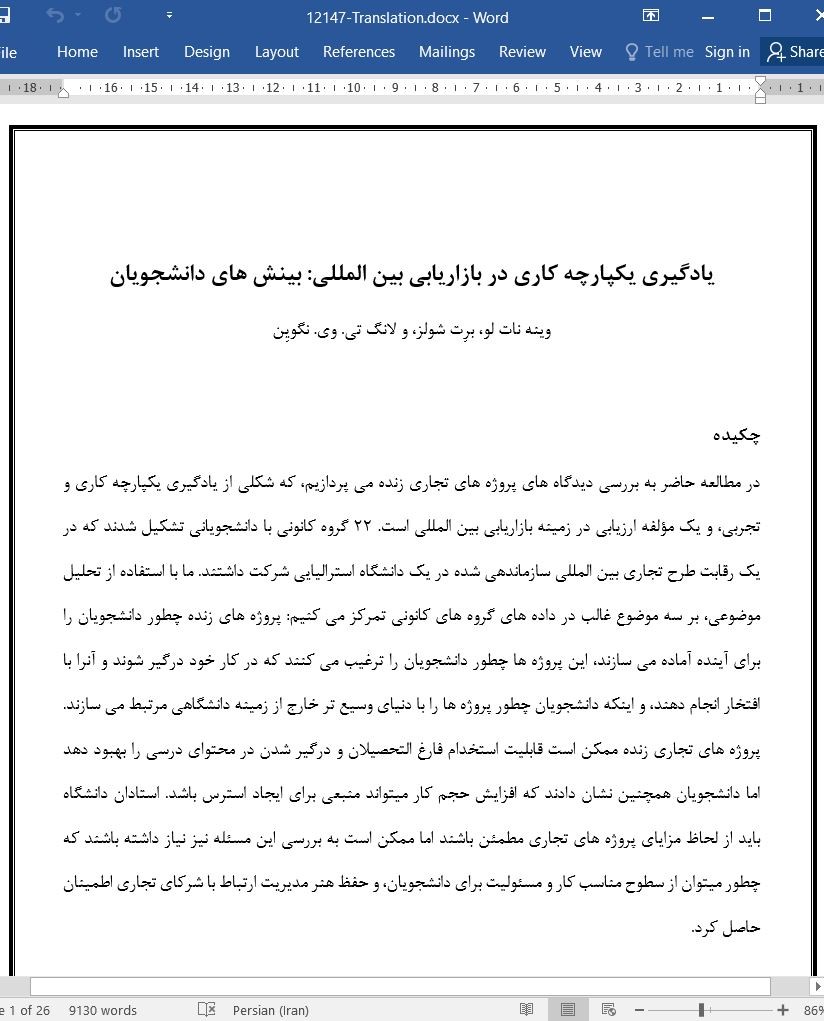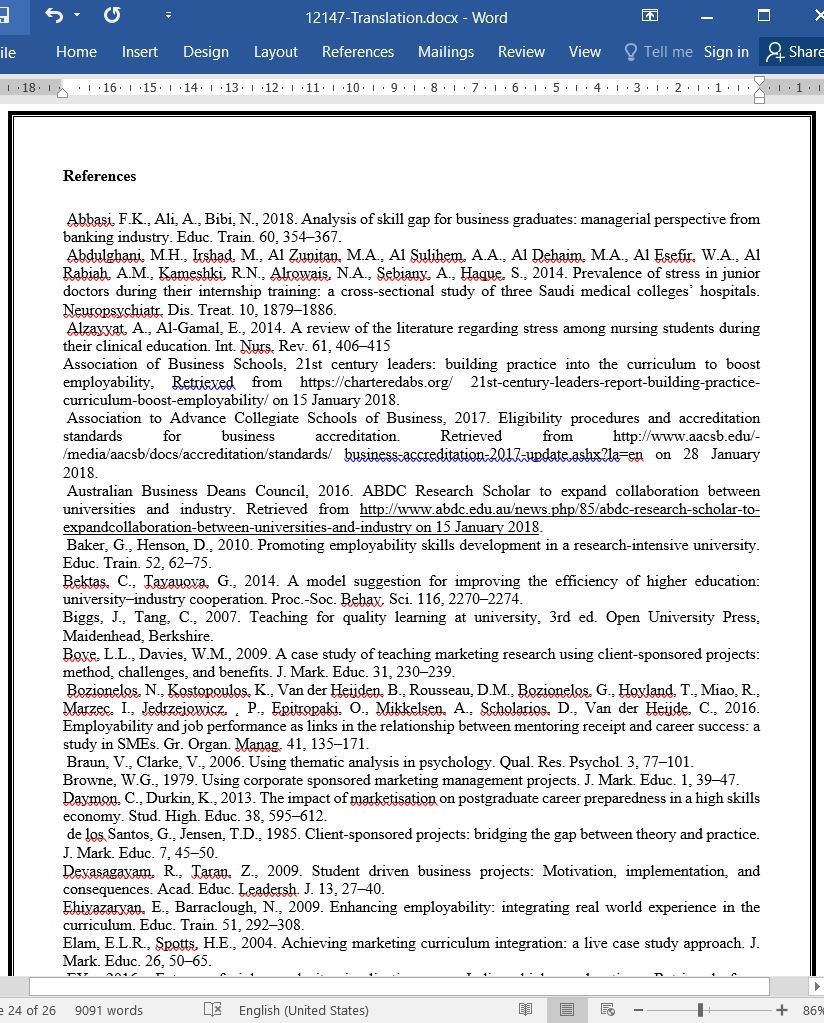
یادگیری یکپارچه کاری در بازاریابی بین المللی: بینش های دانشجویان
چکیده
در مطالعه حاضر به بررسی دیدگاه های پروژه های تجاری زنده می پردازیم، که شکلی از یادگیری یکپارچه کاری و تجربی، و یک مؤلفه ارزیابی در زمینه بازاریابی بین المللی است. 22 گروه کانونی با دانشجویانی تشکیل شدند که در یک رقابت طرح تجاری بین المللی سازماندهی شده در یک دانشگاه استرالیایی شرکت داشتند. ما با استفاده از تحلیل موضوعی، بر سه موضوع غالب در داده های گروه های کانونی تمرکز می کنیم: پروژه های زنده چطور دانشجویان را برای آینده آماده می سازند، این پروژه ها چطور دانشجویان را ترغیب می کنند که در کار خود درگیر شوند و آنرا با افتخار انجام دهند، و اینکه دانشجویان چطور پروژه ها را با دنیای وسیع تر خارج از زمینه دانشگاهی مرتبط می سازند. پروژه های تجاری زنده ممکن است قابلیت استخدام فارغ التحصیلان و درگیر شدن در محتوای درسی را بهبود دهد اما دانشجویان همچنین نشان دادند که افزایش حجم کار میتواند منبعی برای ایجاد استرس باشد. استادان دانشگاه باید از لحاظ مزایای پروژه های تجاری مطمئن باشند اما ممکن است به بررسی این مسئله نیز نیاز داشته باشند که چطور میتوان از سطوح مناسب کار و مسئولیت برای دانشجویان، و حفظ هنر مدیریت ارتباط با شرکای تجاری اطمینان حاصل کرد.
دانشگاه ها بخاطر آماده سازی ناکافی دانشجویان برای نیروی کار، برای جدا بودن از واقعیت (دنیای واقعی)، و برای عدم موفقیت در همگام بودن با روندهای صنعت و ایجاد یک درک عملی از دنیای تجاری برای دانشجویان، مورد انتقاد زیادی قرار گرفته اند (دِیمون و دورکین 2013؛ رید 2015؛ سِلینگو 2016). رویکردهای سنتی برای آموزش دیگر نمی تواند مهارت های لازم را برای دانشجویان فراهم سازد تا بتوانند در محیط مدرن محل کار موفق گردند. بررسی های تحقیقاتی و گزارشات تجاری، شکاف های (نواقص) رایج در مهارت های سودمند فارغ التحصیلان رشته تجارت (بعنوان مثال عباسی و همکارانش 2018؛ جکسون 2016؛ جکسون و چاپمن 2012؛ کارزونینا و همکارانش 2018) از قبیل حل خلاقانه مسائل، ارتباط، کار تیمی، تفکر انتقادی، و مهارت های رهبری و انطباق پذیری را نشان داده اند. در نتیجه دانشگاه ها اکنون از سوی دانشجویان، اعضای هیئت علمی، سیاست گذاران، و همچنین بخش تجارت تحت فشار قرار می گیرند تا آموزش های تجاری باکیفیت بالا، سودمند (مرتبط به رشته خود)، و مؤثری را فراهم سازند (پوکسیارِلی و کاپلان 2016).
Abstract
This study explores students’ perspectives of live business projects, a form of experiential and work integrated learning, as an assessment component in an International Marketing course. Twenty-two focus groups were held with students participating in an international business plan competition organised at an Australian university. Using thematic analysis, we focus on three dominant themes typical of the focus group data: how live business projects prepared students for the future, how such projects motivated students to engage with and take pride in their work, and how the students linked the projects to the wider world outside of the university context. Live business projects might improve employability of graduates and engagement with course content, but students also indicated that the increased workload may be a source of stress. Educators should feel confident in the benefits of live business projects, but may also need consider how to ensure appropriate levels of work and responsibility on students and maintain the art of relationship management with industry partners.
Universities have received much criticism for under-preparing students for the workforce, for being disconnected from reality, and for failing to catch up with industry trends and provide students with an applied understanding of the business world (Daymon and Durkin, 2013; Reed, 2015; Selingo, 2016). Traditional approaches to education can no longer equip students with the necessary skills so that they can be successful in the modern workplace environment. Scholarly enquiries and business reports have pointed out the prevalent gaps in the employability skills of business graduates (e.g., Abbasi et al., 2018; Jackson, 2016; Jackson and Chapman, 2012; Karzunina et al., 2018), such as creative problem solving, communication, teamwork, critical thinking, leadership and adaptability skills. As a consequence, universities are now under significant pressure from students, academics, policy makers, and the business sector alike to provide high-quality, relevant, and impactful business education (Pucciarelli and Kaplan, 2016).
چکیده
استفاده از پروژه های تجاری زنده در طراحی برنامه تحصیلی
گروه های کانونی
تحلیل و بحث
سوگیری آینده
باورهای کارآمدی
آماده شدن برای مسیر شغلی
ترغیب دانش
سوگیری پروژه
مشارکت در کارهای عملی و تعهد
مالکیت
جهت گیری خارجی
مسئولیت و پاسخگویی
محدودیت ها
فراتر از تجربه کارهای عملی
پیامدها، و پیشنهاداتی برای تحقیقات آینده
منابع
Abstract
Using live business projects in curriculum design
Focus groups
Analysis and discussion
Future orientation
Efficacy beliefs
Career preparedness
Knowledge mobilization
Project orientation
Coursework engagement and commitment
Ownership
External orientation
Responsibility and accountability
Limitations
Beyond coursework experience
Implications and future research directions
References
- اصل مقاله انگلیسی با فرمت ورد (word) با قابلیت ویرایش
- ترجمه فارسی مقاله با فرمت ورد (word) با قابلیت ویرایش، بدون آرم سایت ای ترجمه
- ترجمه فارسی مقاله با فرمت pdf، بدون آرم سایت ای ترجمه



